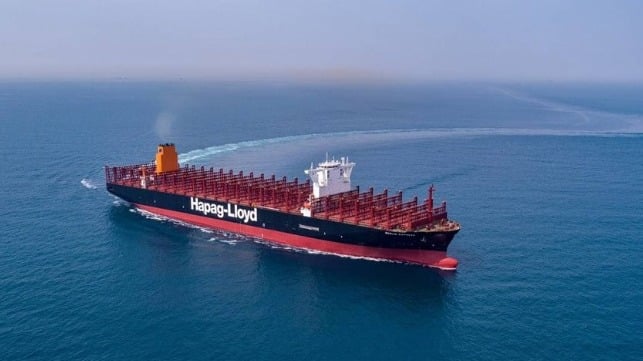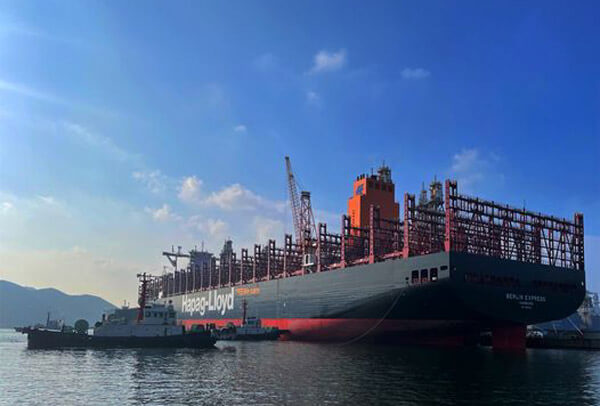Hapag’s First LNG Dual-Fuel Ultra-Large Containership Enters Service

Hapag-Lloyd’s first dual-fuel LNG ultra large containership has entered service as the company moves forward with its fleet modernization efforts. The Berlin Express (250,000 dwt) was scheduled to arrive in Singapore today, June 30, on its first voyage operating on an interim route to the Middle East.
The order for the new class of boxships was initially placed in December 2020 calling for six ultra large containerships to be built by Daewoo Shipbuilding & Marine Engineering. Valued at $1 billion, the order was expanded six months later for a total of 12 containerships.
The new class has approximately 20 percent more capacity than Hapag’s previous largest vessels, the A 19 Class. The company’s largest ships had been built in 2015 and 2016 and were part of the acquisition of United Arab Shipping Co. (USAC). Approved by the European Commission in late 2016, the merger propelled Hapag-Lloyd to the position of the fifth largest container carrier, a spot it remains in according to Alphaliner’s current rankings of the largest carriers.

Berlin Express is running till August to the Middle East before shifting to the Northern Europe route (Hapag)
Hapag points out that the naming of the new vessel is fitting both to demonstrate their long ties with the German capital as well as the fact the Berlin Express name was also used 20 years ago on the company’s then largest vessel. Introduced in April 2003, that Berlin Express had a capacity of 7,500 TEU.
The new class of ship has a rated capacity of 23,664 TEU including 1,500 reefer plugs. They are 1,312 feet in length and operate with a crew of 25. The ships are being registered in Germany.
Berlin Express and her sister ships are being built with MAN ME-GI main engines able to run on both conventional marine diesel as well as liquified natural gas. Hapag joined the elite group of containership operators using LNG in June 2021 with the conversion of one of its existing ships to LNG. According to the company, the new ships are capable of a speed of up to 22 knots and the LNG system can operate the main engine as well as auxiliary engines and boilers.
“With the investment in these large container ships, we will not only be able to reduce our unit costs and improve our competitiveness in Europe-Far East trade, but also take a significant step in the modernization of our fleet,” said Rolf Habben Jansen, CEO of Hapag-Lloyd.
The handover of the Berlin Express took place in South Korea on June 14 at the shipyard now known as Hanwha Ocean. The ship made port calls in China, including its first LNG bunkering at Ningbo. Initially, she will be fueling in Singapore, and later under an LNG supply agreement between Hapag and Shell, she will bunker in Rotterdam.
Till August, the Berlin Express is operating on the line’s route between the Far East and the Arabian Gulf. She will then transfer to her permanent route called the Far East Loop which sails between China, Hong Kong, Taiwan, and Singapore to Spain, Belgium, the Netherlands, the UK, and Germany. She is scheduled to be christened by Elke Büdenbender, wife of the Federal President when the vessel reached Hamburg on October 2.
The second ship of the class, Manila Express, will be delivered in August 2023. Delivery of the entire class of 12 ships is due to be completed before the end of 2024.
